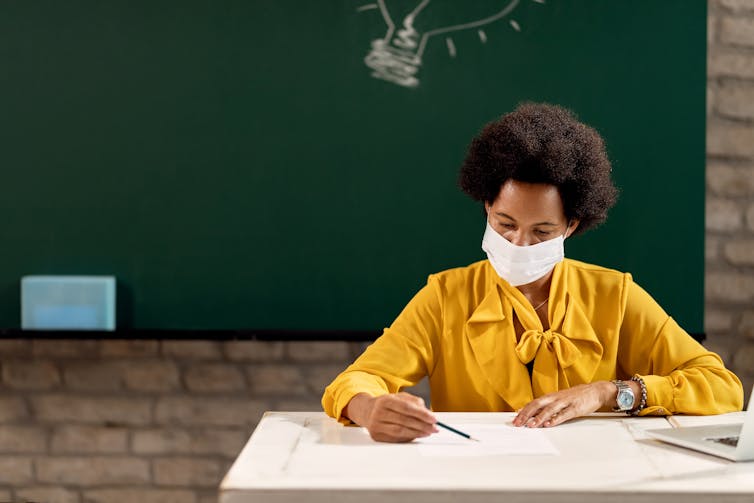Online and in the classroom, COVID-19 has put new demands on teachers
By: Nhlanhla Mpofu, Rhodes University

Shutterstock
As a result of the COVID-19 pandemic, schools were on lockdown in South Africa from March 2020. They only partially reopened in June, despite teacher unions’ concerns about the timing and lack of adequate protection for teachers and learners.
The unions’ objections about having to work in conditions that posed a risk to health were understandable. But they have been less vocal about the teachers’ need to be equipped with the skills and infrastructure to teach during a pandemic.
The unpredictability of the pandemic and the restrictions on social interaction remain in place. No immediate end is in sight. Teachers have had to move from a space in which they have years of experience to the unknown and challenging world of online, remote, correspondence and socially distanced teaching.
The Department of Basic Education produced a COVID-19 guide for teachers focused on creating learning environments using technology. In practice, this meant the teachers needed to facilitate learning with the help of digital tools such as e-learning platforms, online videos and audio tutorials.
But the guide isn’t enough. Teachers are teaching with limited support and skills. My experience as a teacher educator, a researcher in teacher education and as a former high school teacher point to the fact that teachers are woefully under prepared to deal with the current situation.
The average age of South African teachers is 43. This implies that many left teacher training over 20 years ago and might have limited knowledge of designing learning that differs from the face-to-face classroom methods.
Vision for technology
The use of technology to design and transform learning and assessment has been a strategic goal for some years, as captured in the 2004 White Paper on e-Education. Over the years, the Department of Basic Education has added detail to its vision in documents such as Guidelines on e-Safety in Schools: Educating Towards Responsible, Accountable and Ethical Use of Information and Communication Technology in Education and Guidelines for Teacher Training and Professional Development in Information and Communication Technology.
But the department has experienced a number of challenges along the way. One main challenge has been the expense of investing in technology, and whether it’s justified by the return. Even before the pandemic there were challenges with the use of technology in public schools that included inadequate infrastructure, poor internet connectivity and lack of digitally competent teachers.
During the lockdown this reality was made clearer as many public-school teachers who didn’t have the experience, knowledge or infrastructure to facilitate online learning found it challenging.
Based on earlier research it’s much more likely that they didn’t use the technology to its full capacity. For example, previous studies showed that teachers didn’t use technology to help learners produce knowledge.
There’s also the fact that the teacher workforce is largely ageing and technophobic. The instructional methods in an online learning environment differ from the face-to-face classroom that most teachers use. The online ways of supporting learning and attending to different learning styles require skills that teachers from traditional classrooms don’t have.
Added to this is the fact that there is uneven access to digital tools across the country.
The new challenges in teaching
The pandemic has taken the known interactive, collaborative and cooperative classrooms and predictable timetables from teachers and replaced them with uncertainty.
These are perilous times, but teachers are transforming and adapting their knowledge to ensure that learning takes place. Research shows that teachers are able to reshape their knowledge and dispositions to function and respond to any challenging situations.
There is no manual for this situation. But there is an opportunity to rethink and redesign what it means to teach and learn during and after the pandemic. Importantly, it’s a chance to address the gross inequalities and inadequacies in South African education.![]()
Nhlanhla Mpofu, Associate Professor, Rhodes University
This article is republished from The Conversation under a Creative Commons license. Read the original article.
Written by: Natasha
Similar posts
MORE ARTICLES

ANC Youth League demands justice for Sindiso Magaqa beyond hitman’s conviction

Liverpool FC vows to pay out Diogo Jota’s R350 million contract to his widow

The World Show with Nicky B broadcasts live from France

Sindiso Magaqa assassin handed an 85-year sentence

Skhumba, Kgomotso and Glen weigh in on reincarnation
QUICK LINKS
UpComing Shows

The Best T in the City
With T Bose
He has held it down in the world of mid-morning radio with the best music, riveting topics, brilliant mixes and interesting guests. Every weekday, The Best T proves why he is the BEST by connecting to you like only your bro or favourite uncle could. He lets his listeners dictate the songs they want to hear in the ever-popular Top 10 at 10, and his Three Teaspoons never run out. Catch The Best T in the City Mondays to Fridays from 09h00 to 12h00.
close
Feel Good
With Andy Maqondwana
Feel good about feeling good! That's exactly what The Feel-Good show is about. An escape from the negativity that surrounds us, indulging you in good feels. Pass it on to one and all. Spread the good feeling around Gauteng with Andy Maqondwana.
close
Kaya Biz
With Gugulethu Mfuphi
The world of business is simplified for you by Kaya Biz with Gugulethu Mfuphi. This fast-paced award-winning business show talks to the corporate giants as well as up and coming entrepreneurs about their wins and challenges. Gugulethu invites guests to offer their analyses of markets and economies, and also delves into issues of personal financial wellness. Kaya Biz airs Mondays to Thursdays 18h00 to 19h00.
close
Point of View
With Phemelo Motene
Point of View with Phemelo Motene delves into the day’s current affairs, touches on real issues that affect people’s daily lives and shares expert advice on questions posed by the audience. Mondays to Thursdays 20:00 to 22:00.
closeConnect with Kaya 959
DownLoad Our Mobile App
© 2025 Kaya 959 | On The Street On The Air











